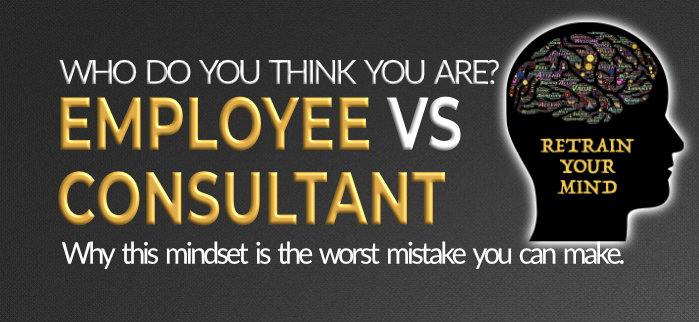Most Filipino freelancers suffer from what I call “The Employee Mindset”. And this is preventing them from getting clients who treat them with respect, consult them on their opinions, and are eager to pay them higher rates.
But before I dig deeper into the effects of the Employee Mindset, let's start by exploring what it means.
What is the “Employee Mindset”?
When you're a freelancer, it's very easy to think of yourself as an employee. After all, that's what most people are – they go to a company, get a job interview, wait for return calls, and get hired. Then, once they are hired, they are given tasks to do, and then they do those tasks. Every month, they get paid a salary.
So many Filipino freelancers look at the employee experience and assume that they have to do the exact same thing once they try freelancing. Including these approaches:
- They wait for the client to tell them what to do, what the project is.
- They show up at client interviews thinking that the purpose of the interview is to answer the client's interview questions correctly.
- They wait for the client's approval – on hiring them, on the work they do, on what the next project is.
And this kind of mindset has the following negative results:
- Act like a low-level employee, and your clients will treat you like one.
- You have very little control of what the project tasks are, how long the project will last (one-time or long-term?), and how much you'll get paid.
- You work with clients who don't know what they want, don't give clear instructions, or give you tasks that don't really help their business (and when they realize this, they will terminate the project).
So if freelancers shouldn't think or act like employees, what should they do instead?
Filipino Freelancers Should Cultivate the “Consultant Mindset”
Rather than thinking of yourself as an employee, it's time to start thinking of yourself as a consultant. What's the difference?
Consultants know that they have specialized skills, knowledge, or experience in what they do. While employees also have these things, they think of themselves just as the ones who only execute the project tasks. Consultants, on the other hand, think of themselves as those who use their skills, knowledge, or experience toplan for and take the lead in a project from start to finish.
Consultants also know that even though clients are smarter or more experienced in some things, they are inexperienced or not as skilled in other things – that's why they're hiring help in the first place!
And this is how they approach their work:
- Instead of waiting for a client's instructions, they tell the client “Based on the goals and problems you've told me, here's are my suggestions on what the project should be….”
- Instead of obsessing about giving the correct answers during client interviews, they are the ones who ask the client several probing questions so that they can understand the details of the client's business, and they use this detailed knowledge to propose more projects in the future.
- Instead of waiting for a client's approval on everything, they step up and take initiative, saying things like “You mentioned that you're also having problems with this part of your business, here are 3 ideas that I think will help. Let me know if you want me to do one of them.” And, if the client is too busy to respond, they always follow up.
See, it's not just about doing your work well. It's also about taking the client in the direction that they want to go by solving their problems and helping them reach their goals – even if it has nothing to do with the initial project.
Because of this approach, freelancers with the Consultant Mindset experience the following benefits:
- Clients treat them like a partner and involve them in many aspects of their business. As a result, clients ask for their opinion and keep hiring them as long as possible.
- Freelancers who think like entrepreneurs or consultants also tend to get paid higher. According to the Freelance Industry Report for 2012 (see PDF here), those who think like a consultant or entrepreneur are more likely to get paid higher than those who don't think like a consultant.
- Rather than waiting for more and more work, the consultant freelancer keeps creating work for himself/herself because they propose projects that the clients don't even know that they need.
How to Start Being a Consultant
If you want to start acting more like a consultant than an employee, just making the decision in your mind isn't enough. But, the good news is that there are some simple changes you can make if you want to start being a consultant:
1. Describe your job based on the results you bring, not based on your output.
Here's what most freelancers do. They say “I'm a freelance writer.” Or “I'm a freelance designer.” Or “I'm a virtual assistant.” They think that this is a good way to present themselves and describe their jobs.
But here's the thing – clients don't understand these words! How many times has someone asked you, “Saan ka na nag-wowork ngayon?” and you answer them, “Freelance designer/writer/VA na ako”? I'll bet most of the people who hear your response say, “Ano yun?”.
That kind of response is not exclusive to Filipinos. Most people outside the freelancing industry have no idea what a freelancer is. And even if they do, they don't know how having a freelance writer, designer, VA, etc. can help them with their business.
Here's a better script to say:
“My name is [Insert Your Name Here]. And I help [Insert Your Types of Clients Here] [The Goals You Help Them Reach or The Problem You Help Them Fix].”
Here's how I use this script:
“My name is Celine and I help US small businesses get more customers online.
This approach is easier for clients to understand. Plus, it broadens the type of work you do. You're not limited to writing, or design, or VA tasks. You're basically saying that you'll do everything you can to help your clients reach their goals or solve their problems.
2. On your next client interview, start asking deep questions about the client's business.
Rather than just answering questions during the client interview, take advantage of this opportunity to get to know the intimate details of your client's business. Ask them questions like:
- What are your top 3 goals for your business within the next year?
- What are the main obstacles preventing you from achieving these goals?
- What methods have you tried before to help reach those goals? How did they work for you?
Your client's answers to these questions can help you do the following things:
- You can sell your services easier by talking about the right benefits. While your competitors will just try to sell the client on useless benefits they don't care about, such as: “I can write articles that have perfect grammar and easy to read” or “The logo I'll design for you will be beautiful”, the benefits you'll tell your client will be relevant to their goals. For example, you'll say: “You mentioned that you wanted a writer for your blog so you can bring in more customers. The articles I'll write will be written specifically to attract the type of customers you want” or “You said you want your company to appear professional and trustworthy. The logo I'll design for you will reflect that.”
- At the end of the project, instead of just waiting if the client will give you another project, you can say “When we first talked, you mentioned that your goal was [Insert their goal here]. I have a few suggestions on how you can reach that goal. Would you be interested?” BOOM. You've essentially created new jobs for yourself.
As you can see, it doesn't take much work to try the Consultant Mindset. Just by changing your job description and by asking the right questions, you'll soon be on your way.
Are you still stuck in the employee mindset? We'd love to hear your thoughts. Drop them on the comments.








Thanks for publishing my article, Florante!
By the way, the free gift/video I made for Certified Freelance readers can be found here: http://www.pinoy500.com/certified/
It's called: "Do clients really set the rates? NO. Here's why." Check it out!
Hi Celine,
Thanks for sharing these great tips and reminders. I'm sure many of the CF readers will find these useful in realigning their freelancing goals.
Florante
Hi Celine…Hi Florante!
Great article! It's a hard transition but not an impossible one. And if one is determined to achieve higher goals then the consultant and/or entrepreneur mindset will really pave the way for reaching those goals. Thanks again Ms. Celine 🙂
[…] freedom you deserve, walk away from what keeps you from growth. And yes, walk away from the common employee mindset that so plague […]